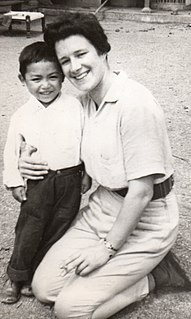A Quote by Philip Kitcher
Britten's opera tends to see things in simpler terms. It portrays an Aschenbach who wants a richer form of sexual fulfillment, and who is hemmed in by the social conventions to which he subscribes. But Visconti's use of the Mahler Adagietto is perfect for what I take to be Aschenbach's sexual desire.
Related Quotes
Think about Mann's own daily routine (ascribed to Aschenbach), read the extant diaries and the letters in which he discusses the novella's themes, and it won't be so obvious that the attraction to Tadzio is completely unprecedented; it also won't be obvious that what Aschenbach wants is full sexual contact.
Presenting Aschenbach as a composer - based on Mahler - leads to some dreadful scenes (especially those in which Aschenbach is berated by his student), and it surely distorts the character Mann created. Yet, we know that Mann's novella was based on a holiday in Venice he took with his wife and brother, and that while he was there he followed the reports in the German newspapers, describing the dying Mahler's progress as he returned from New York to Vienna.
We find in the novella a seamless interweaving of at least two narrative voices, one of which is that of an observer so sympathetic that his language appears to be Aschenbach's own, the other of which is superficially celebratory (except at the moment of moralistic condemnation) but undercuts Aschenbach by means of an ironic detachment.
God wants a love partner, centering on the place where husband and wife become one through their sexual organs, God wants to appear and meet us...I wish you would center on the absolute sexual organ, unique sexual organ, unchanging sexual organ and eternal sexual organ and use this as your foundation to pursue God...We have to realize that the Kingdom of God on earth and in heaven will begin on this foundation.
An intelligent couple can read their Darwin and know that the ultimate reason for their sexual urges is procreation. They know that the woman cannot conceive because she is on the pill. Yet they find that their sexual desire is in no way diminished by the knowledge. Sexual desire is sexual desire and its force, in an individual's psychology, is independent of the ultimate Darwinian pressure that drove it. It is a strong urge which exists independently of its ultimate rationale.
Consider the different narrative styles within the story, and the glee with which the "moralistic narrator" celebrates Aschenbach's fall - maybe, then, this is a hostile verdict and the international fame is warranted after all (given that Mann modeled his protagonist so closely on himself, it would be quite odd if he had intended Aschenbach's literary inferiority to be a fixed part of the interpretation).
I found a deep kinship between Mahler's recurrent attempts to confront all sides of life and to affirm himself in the face of his own finitude, and Aschenbach's dedication to persevere in the literary evocation of beauty. Exploring this kinship led me to reflect on many of Mahler's songs and symphonies - and particularly his great masterpiece, Das Lied von der Erde. The end result was a way of reading Mann that I hadn't originally anticipated at all.





















